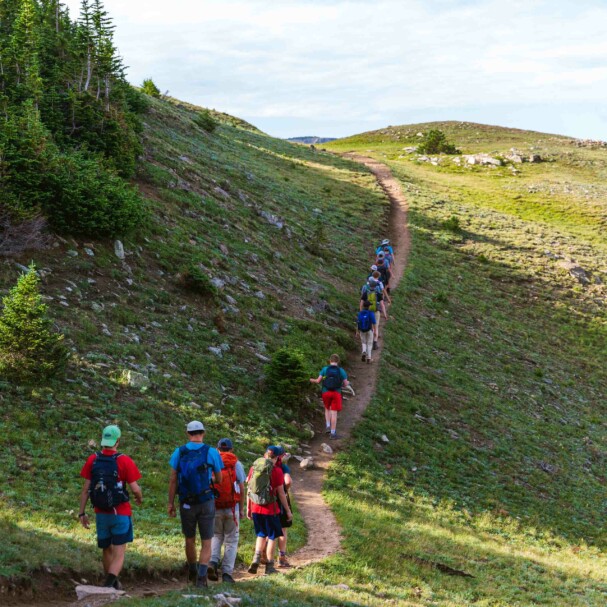Land Acknowledgement
At Cheley Colorado Camps, we have a deep and abiding respect and care for the natural world. The joy of being outside and in nature is one of the highest joys that humanity can possess; therefore, it is our responsibility to understand the long-standing history of these lands and waters and to seek to understand our place within that history.
Cheley Colorado Camps acknowledges, with respect, that the land we are on today is on the traditional and ancestral homelands of the Arapaho, Cheyenne, Ute (Núu-agha-tʉvʉ-pʉ̱), and Eastern Shoshone peoples. Our properties – Land O’Peaks, Trail’s End Ranch for Boys and for Girls, the Outpost, Blue Valley, Pierson, and Fish Creek Ranch – were also a place of trade, gathering, and healing for numerous other Native tribes.
We are conscious of and saddened by the exclusions and erasures of Indigenous peoples that resulted in our being on stolen land. While the Treaty of Fort Laramie (1851) and Cession 426 promised friendship, they elicited the displacement of people with the forced removal from their lands. Despite these atrocities, the continued cultural vibrancy, resilience, and traditions live on with Indigenous communities today.
At Cheley Colorado Camps, we honor with gratitude the legacy and the history of these tribes – past, present, and future. We also recognize the contributions Indigenous peoples have made, both in shaping and strengthening our community in particular and our state and country as a whole. Friendship Circle was originally based on circular gatherings, which are deeply rooted in the traditional practices of several First Nations (e.g. healing circles). Chipeta is a namesake from the wife of Ouray – the chief of the Tabeguache (Uncompahgre) band of the Ute tribe – who Frank Cheley greatly admired for being outspoken and lobbying for her people’s rights. Additionally, in Arapaho, Haiyaha means “big rocks.”
This acknowledgment, brief and in no way complete, demonstrates a commitment toward the healing of these lands and waters and is a step toward reconciliation with these Native communities. We call on our peers in the Summer Camp industry and in our community to join us in acknowledging the Indigenous peoples as original stewards of this land. As we enjoy the privilege and beauty of these lands and waters, we must continue to recognize their significance to the people who came before us and those that are still here today.
Know the Land
What is a Land Acknowledgment?
A Land Acknowledgment is a formal statement that recognizes and respects Indigenous Peoples as traditional stewards of this land and the enduring relationship that exists between Indigenous Peoples and their traditional territories.
Why do we recognize the Land?
To recognize the land is an expression of gratitude and appreciation to those whose territory you reside on, and a way of honoring the Indigenous people who have been living and working on the land from time immemorial. It is important to understand the long standing history that has brought you to reside on the land, and to seek to understand your place within that history. Land acknowledgements do not exist in a past tense, or historical context: colonialism is a current ongoing process, and we need to build our mindfulness of our present participation. It is also worth noting that acknowledging the land is Indigenous protocol.
How to acknowledge the Land?
Often, land acknowledgements are concise, along the lines of: “I want to acknowledge that we are on the traditional territory of [nation names].” Some people may also mention the name of a local treaty. Some may learn the language and speak a few words in it.
If you are not sure how to pronounce a nation’s name, there are a number of ways to learn, including:
- Respectfully asking someone from that nation or from a local organization such as a Friendship Center or Indigenous Student Center;
- Check the nation’s website, they may have a phonetic pronunciation on their “About” page, an audio-recording of their name, or videos that include people saying the nation’s name; or
- Call the nation after hours and listen to their answering machine recording.
While a brief acknowledgement may work for some groups, others wish to add more intention and detail to acknowledgements. To thoughtfully prepare an in-depth acknowledgement requires time and care. You may find it helpful to reflect on and research questions such as:
- Why is this acknowledgement happening?
- How does this acknowledgement relate to the event or work you are doing?
- What is the history of this territory? What are the impacts of colonialism here?
- What is your relationship to this territory? How did you come to be here?
- What intentions do you have to disrupt and dismantle colonialism beyond this territory acknowledgement?
Whose Land are you on?
Native Land is an app to help map Indigenous territories, treaties, and languages.
